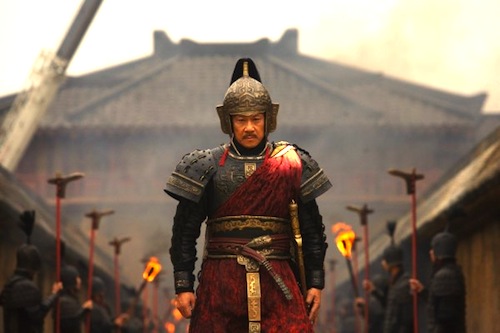By Joe Bendel. Generally ascribed to Yuan Dynasty playwright Ji Junxiang, The Orphan of Zhao was the first Chinese play to be translated in Europe. It was even adapted (quite liberally) for the French stage by Voltaire. Profoundly tragic and also rather violent in places, it has timeless elements that continue to appeal to audiences. Celebrated auteur Chen Kaige vividly captures both qualities in his grand big screen version, Sacrifice, which opens this Friday in New York.
General Tu Angu is not a man to take the slights of the Zhao clan lightly. Framing the patriarch and his son, General Zhao Shuo, for the murder of the ruling Duke, Tu uses the outrage as pretext for wiping out the Zhao clan. A swifter, more awe-inspiring massacre you are not likely to see on film anytime soon. However, he misses two of the Zhaos, the young General’s wife, Princess Zhuang, and her newborn baby. Sacrificing herself for her child, Zhuang entrusts the infant heir to her doctor, respected commoner Cheng Ying.
As fate would dictate, Cheng’s wife has also recently delivered. Suddenly having a newborn is dangerous business and Cheng has two. In a truly Biblical turn of events, Tu orders all the town’s babies to be collected at his palace to be duly vetted. Through a catastrophically Shakespearean turn of events, the Zhao and Cheng babies essentially trade places.

Growing up as Cheng Wu, the presumed son of Dr. Cheng, the Zhao orphan knows nothing of his birthright. However, unbeknownst to the boy, the doctor is grooming him to take wreak his vengeance at the appropriate time. To do this he plays a dangerous game, entering the service of the Tu retinue, manipulating his nemesis into serving as Cheng Wu’s godfather. Needless to say, some rather messy issues of filial loyalty arise.
Some have often knocked Chen’s films as pretty but rather bloodless historical dramas, but this is absolutely not the case with Sacrifice. While the period trappings are as richly detailed as ever, there is also plenty of blood. In fact, the first act is quite a spectacle of mayhem, segueing into a tense cat-and-mouse game, in which the fate of the city’s infants hangs in the balance. The film ultimately settles into a stone cold revenge drama.
Featuring several of Chen’s semi-regulars, Sacrifice’s talented ensemble is equally adept at the stately tragedy and the gutty action sequences. As Tu Angu, Wang Xueqi is in his element. Ruthless yet charismatic, he is the sort of villain viewers find themselves identifying with, in spite of themselves. While Ge You might be better known to American audiences for his shticky work in Let the Bullets Fly, he wrings real pathos from his performance as Dr. Cheng. While her character is not long for the world, Fan Bingbing is a typically ethereal presence as Princess Zhuang. Yet it is Mainland TV star Hai Qing who really lowers the emotional boom as Cheng’s equally ill-fated wife.
Admirers of Chen’s Chinese Opera sagas Farewell My Concubine and Forever Enthralled should still appreciate the classical elegance of Sacrifice. It is based on a play, after all. Likewise, fans of more action-driven Asian cinema should never get bored with the relentless scheming and vigorous swordplay. Indeed, Chen integrates the intimate and the epic halves quite masterfully. Highly recommended for fans of literate historicals and the wuxia genre, Sacrifice opens this Friday (7/27) in New York at the Quad Cinema.
LFM GRADE: A
Posted on July 23rd, 2012 at 8:37pm.
Nice review.